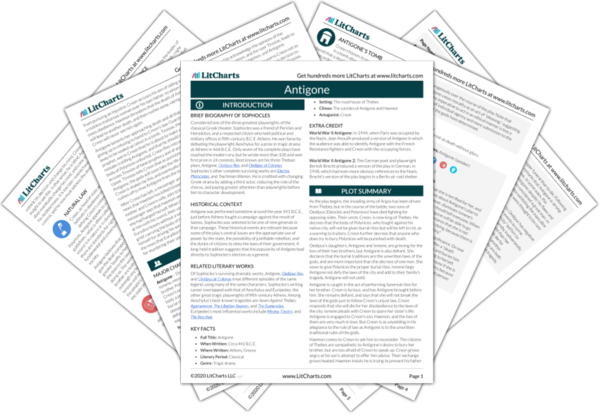The ancient Greeks believed that their gods could see the future, and that certain people could access this information. Independent prophets called "seers" saw visions of things to come. Oracles, priests who resided at the temples of gods—such as the oracle to Apollo at Delphi—were also believed to be able to interpret the gods' visions and give prophecies to people who sought to know the future. Oracles were an accepted part of Greek life—famous leaders and common people alike consulted them for help with making all kinds of decisions. Long before the beginning of Antigone, Oedipus, Antigone's father, fulfilled one of the most famous prophecies in world literature—that he would kill his father and marry his mother (these events are covered in detail in Sophocles's Oedipus Rex). Despite his efforts to avoid this terrible fate, it came to pass. When Oedipus learned what he had inadvertently done, he gouged out his own eyes and was banished from Thebes. Before dying, he prophesied that his two sons, Polynices and Eteocles, would kill each other in the battle for Thebes (see Oedipus at Colonus). This, too, comes to pass.
Yet when the prophet Tiresias visits Creon in Antigone, he comes to deliver a warning, not an unavoidable prophecy. He says that Creon has made a bad decision, but that he can redeem himself. "Once the wrong is done," Tiresias says, "a man can turn his back on folly, misfortune, too, if he tries to make amends, however low he's fallen, and stops his bullnecked ways." While Oedipus never has a choice—his fate was sealed—in this case Creon seems to have more free will. He chooses to remain stubborn, however, until it's too late and he is caught in the grip of a terrible fate that he can't escape.
Fate vs. Free Will ThemeTracker

Fate vs. Free Will Quotes in Antigone
and the mood and mind for law that rules the city—
all these he has taught himself
and shelter from the arrows of the frost
when there's rough lodging under the cold clear sky
and the shafts of lashing rain—
ready, resourceful man!
Never without resources
never an impasse as he marches on the future—
only Death, from Death alone he will find no rescue
but from desperate plagues ha has plotted his escapes.
have never tasted devastation. For others, once
the gods have rocked a house to its foundations
the ruin will never cease, cresting on and on
from one generation on throughout the race—
like a great mounting tide
driven on by savage northern gales,
surging over the dead black depths
roiling up from the bottom dark heaves of sand
and the headlands, taking the storm's onslaught full-force,
roar, and the low moaning
echoes on and on
smashing against the high throne of Justice!
Your life's in ruins, child—I wonder…
do you pay for your father's terrible ordeal?
he'd never finish.
nothing worse than they mete out to me—
these masters of injustice!
raging through the girl.
once more, on the razor-edge of fate.
I loose them like an archer in my anger,
arrows deadly true. You'll never escape their
burning, searing force.
I don't even exist—I'm no one. Nothing.
with mighty blows of fate, and at long last
those blows will teach us wisdom.
















